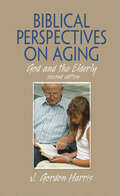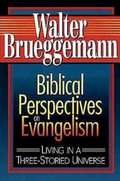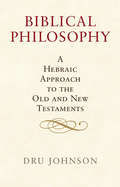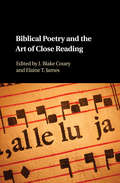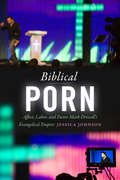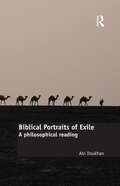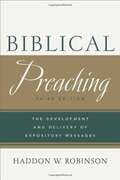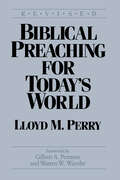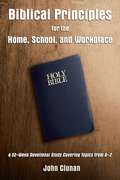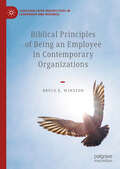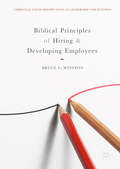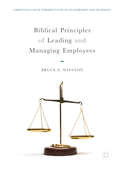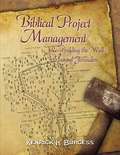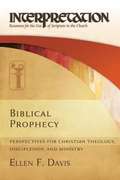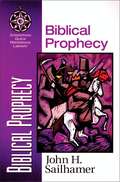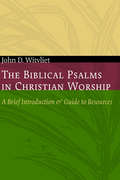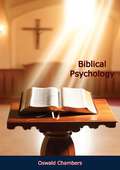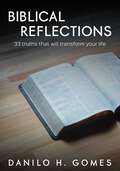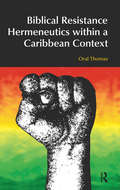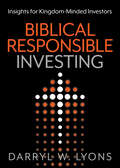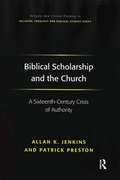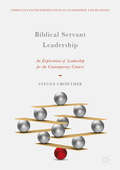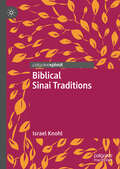- Table View
- List View
Biblical Perspectives on Aging: God and the Elderly, Second Edition
by J. Gordon HarrisAs the population of older Americans grows, meaningful perspectives on aging are needed by both the young and the old. Biblical Perspectives on Aging: God and the Elderly takes a detailed look at the views of aging presented in the Old and New Testaments. This wide ranging and insightful survey encompasses not only the entire Bible but also interpretations of sacred Middle Eastern and Judaic documents. This new expanded edition of the original classic text adds thorough discussions of the wisdom of the Bible and Jewish literature with ways to interpret these readings and what they teach about spirituality and growing older.Approaches to aging issues have changed in recent years. With the average American lifespan increasing, the view of old age as a solitary time of waiting has been pushed aside. So too has the assumption that the elderly simply want to remember “the good old days.” This updated edition of Biblical Perspectives on Aging: God and the Elderly has expanded its scope to incorporate and address the effects of these changing views. This sweeping study of the Bible’s positive treatment of aging and elderly figures sheds new light on contemporary society’s negative view of the elderly and what can be done about it. Clear examples from both Scripture and literature provide a wealth of understanding, comfort, and wisdom to everyone interested in aging and the Bible. In addition, this new edition explores the changing relationships that exist among aging, hermeneutics, mentoring, and spirituality. The new insights revealed here reinvigorate the challenge against ageism and traditional pictures of old age as a time of withdrawal and living in the past.Among the issues explored in Biblical Perspectives on Aging: God and the Elderly are aging experiences and the Bible, biblical theology and its role in social support for the elderly, hermeneutics and old age, spirituality and its relationship to aging, cross-generational relationships and mentoring, and a detailed index of Old and New Testament Scripture references.Accessible and concise, with compelling arguments and numerous examples, Biblical Perspectives on Aging: God and the Elderly is an ideal resource for pastors, seminary students, professionals, and leaders of programs for the elderly. It shows both young and old that while aging may not be easy, Biblical theology can ease some of its mystery.
Biblical Perspectives on Evangelism: Living in a Three-Storied Universe
by Walter BrueggemannIn this timely and provocative work, Walter Brueggemann applies his experience and skills in the area of biblical interpretation to the theme of evangelism. He argues for the importance of considering afresh how the Bible itself thinks and speaks about evangelism, how it enacts the dramatic claims of the "good news." Brueggemann here describes evangelism as a drama in three scenes, concerning (1) God's victory over the forces of chaos and death, (2) the announcement of that victory, and (3) its appropriation by those who hear the announcement. This same dramatic sequence, as he shows, is many time re-enacted in the Bible; the times and circumstances of the re-enactment may differ, but the essential message, as well as the structure of its presentation, remains the same.
Biblical Philosophy: A Hebraic Approach to the Old and New Testaments
by Dru JohnsonIn Biblical Philosophy, Dru Johnson examines how the texts of Christian Scripture argue philosophically with ancient and modern readers alike. He demonstrates how biblical literature bears the distinct markers of a philosophical style in its use of literary and philosophical strategies to reason about the nature of reality and our place within it. Johnson questions traditional definitions of philosophy and compares the Hebraic style of philosophy with the intellectual projects of ancient Egypt, Mesopotamia, and Hellenism. Identifying the genetic features of the Hebraic philosophical style, Johnson traces its development from its hybridization in Hellenistic Judaism to its retrieval by the New Testament authors. He also shows how the Gospels and letters of Paul exhibit the same genetic markers, modes of argument, particular argument forms, and philosophical convictions that define the Hebraic style, while they engaged with Hellenistic rhetoric. His volume offers a model for thinking about philosophical styles in comparative philosophical discussions.
Biblical Poetry and the Art of Close Reading
by J. Blake Couey Elaine T JamesThis volume explores the aesthetic dimensions of biblical poetry, offering close readings of poems across the Hebrew Bible/Old Testament. Composed of essays by fifteen leading scholars of biblical poetry, it offers creative and insightful close readings of poems from across the canon of the Hebrew Bible/Old Testament (Psalms, wisdom poetry, Song of Songs, prophecy, and poetry in biblical narrative). The essays build on recent advances in our understanding of biblical poetry and engage a variety of theoretical perspectives and current trends in the study of literature. They demonstrate the rewards of careful attention to textual detail, and they provide models of the practice of close reading for students, scholars, and general readers. They also highlight the rich aesthetic value of the biblical poetic corpus and offer reflection on the nature of poetry itself as a meaningful and enduring form of art.
Biblical Porn: Affect, Labor, and Pastor Mark Driscoll's Evangelical Empire
by Jessica JohnsonBetween 1996 and 2014, Mark Driscoll's Mars Hill Church multiplied from its base in Seattle into fifteen facilities spread across five states with 13,000 attendees. When it closed, the church was beset by scandal, with former attendees testifying to spiritual abuse, emotional manipulation, and financial exploitation. In Biblical Porn Jessica Johnson examines how Mars Hill's congregants became entangled in processes of religious conviction. Johnson shows how they were affectively recruited into sexualized and militarized dynamics of power through the mobilization of what she calls "biblical porn"—the affective labor of communicating, promoting, and embodying Driscoll's teaching on biblical masculinity, femininity, and sexuality, which simultaneously worked as a marketing strategy, social imaginary, and biopolitical instrument. Johnson theorizes religious conviction as a social process through which Mars Hill's congregants circulated and amplified feelings of hope, joy, shame, and paranoia as affective value that the church capitalized on to grow at all costs.
Biblical Portraits of Exile: A philosophical reading (Routledge New Critical Thinking in Religion, Theology and Biblical Studies)
by Abi DoukhanExile constitutes one of the most central experiences in the Bible, notably in the book of Genesis. The question has rarely been asked however as to why exile plays such an important role in the lives of Biblical characters. Biblical Portraits of Exile proposes a philosophical reading largely inspired by the philosophy of Emmanuel Levinas of the experience of exile in the book of Genesis. Focusing on the 8 central figures of exile Adam, Eve, Cain, the sons of Shem, Abraham, Rebekah, Jacob and the sons of Levy the book draws out the ethical and redemptive implications of exile and thereby paves the way for a renewed description of the human subject, one that situates ethics at its very core.
Biblical Preaching: The Development and Delivery of Expository Messages
by Haddon W. RobinsonThis bestselling text by Haddon Robinson, considered by many to be the "teacher of preachers," has sold over 300,000 copies and is a contemporary classic in the field. <p><p>It offers students, pastors, and Bible teachers expert guidance in the development and delivery of expository sermons. This new edition has been updated throughout and includes helpful exercises.
Biblical Preaching for Today's World
by Lloyd Perry"Biblical preaching has not outgrown its usefulness. The methods may vary, but the message remains the same. God's challenge and call to the preacher still come through loud and clear: 'Preach the Word.'"Lloyd M. Perry's Biblical Preaching for Today's World has been helping pastors and speakers preach the Word since 1973. Although the principles Perry originally established are timeless, the needs and concerns of audiences are always changing. To help pastors preach more effectively to today's congregations, Perry has updated his original manuscript. He offers pastors help in understanding and adjusting to the effects television has had on an audience's listening skills. Historical references throughout each chapter will also help preachers learn from yesterday's teachers and styles. Biblical Preaching for Today's World continues to offer sound, time-tested principles for preaching, regardless of the preacher's style. Filled with helpful suggestions, annotated outlines, and solid documentation, it is invaluable reading for all who aspire to preach the Word.
Biblical Preaching for Today's World
by Lloyd Perry"Biblical preaching has not outgrown its usefulness. The methods may vary, but the message remains the same. God's challenge and call to the preacher still come through loud and clear: 'Preach the Word.'"Lloyd M. Perry's Biblical Preaching for Today's World has been helping pastors and speakers preach the Word since 1973. Although the principles Perry originally established are timeless, the needs and concerns of audiences are always changing. To help pastors preach more effectively to today's congregations, Perry has updated his original manuscript. He offers pastors help in understanding and adjusting to the effects television has had on an audience's listening skills. Historical references throughout each chapter will also help preachers learn from yesterday's teachers and styles. Biblical Preaching for Today's World continues to offer sound, time-tested principles for preaching, regardless of the preacher's style. Filled with helpful suggestions, annotated outlines, and solid documentation, it is invaluable reading for all who aspire to preach the Word.
Biblical Preaching for Today's World (Revised Edition)
by Lloyd M. PerryRevised to suit the requirements of the present day listeners, the book contains Biblical preaching for today's world. This book provides both new and experienced preachers with the concepts, structures, and resources essential for effective biblical preaching. It is the product of many years of Dr. Perry's intensive study, gifted teaching, Spirit-directed preaching, and practical writing.
Biblical Principles for the Home, School, and Workplace: A 52-Week Devotional Study Covering Topics from A – Z
by John ClunanMost of us spend the majority of our time on this earth at home, school, and the workplace. If you’re in school, you may also be spending time on any number of extracurricular activities, and if you’re in the workplace, you may also be spending time on additional work-related activities such as traveling to meet with customers, attend conferences, and participate in offsite training and team-building activities, just to name a few. In other words, we’re all busy, and in some cases we feel like you’re too busy. So home should be our respite from the demands of school and the workplace, right? It should be a place of comfort and relaxation. But that’s not necessarily the case because we’re also busy managing numerous responsibilities at home, as well as caring for our most important relationships. <P><P> OK, so other than stating the obvious, what point am I trying to make? The point is this: we need help navigating through life. We need guidance and wisdom to manage our responsibilities, and in particular our relationships. The question is, where are we going to turn for answers? While there are many options, there’s only one best option, and that’s God’s Word. I want to point you to God’s Word to help you address the myriad concerns and issues that are common to everyone. These concerns and issues are relevant at home, they are relevant at school, and they are relevant in the workplace. While acknowledging there are many wonderful daily devotional books that are readily available, this devotional book is different. Rather than presenting a different devotional topic every day, I’ve intentionally chosen to address one important topic each week. <P><P> I’ve done this because I want you to have the opportunity during the week to reflect upon and apply the Biblical concepts of God’s Word. This will allow God’s Word to become more fully implanted into your heart and mind, allowing you to grow and become more equipped to handle the challenges of life in a manner that’s pleasing to God. I’ve even added a journal section following each devotional that will allow you, if you choose to do so, to express your thoughts and experiences for the week as they pertain to the topic. <P><P> There’s even enough space for you to add to your journal as you further reflect upon the various topics during the course of the year or subsequent years. It’s my heart’s desire that you, your family, your classmates, your coworkers, your customers, your neighbors, and even strangers will be richly blessed because you chose to read this devotional book. In particular, I pray that as you spend time reflecting upon and applying the wonderful principles from God’s Holy Word, you’ll grow in your knowledge and your love for Him and His Son Jesus Christ.
Biblical Principles of Being an Employee in Contemporary Organizations (Christian Faith Perspectives in Leadership and Business)
by Bruce E. WinstonThis book focuses on how employees should work and follow in contemporary organizations. It begins with the call from Col 3:22-24 for employees to treat work as worship to God and to conduct their work to the best of their ability (Prov 22:29). It then explains how employees should help each other but not to the point of self-defeat (Galatians 6). Employees are then cautioned for the need to be true followers but to know the extent to which being a follower might call them to be committed to both the organization and the leader/manager. This is the concept of Akoloutheo. The rewards of being diligent and faithful employees are conveyed through an examination of the Parable of the Talents. The book concludes with an admonishment to everyone to prepare versus plan for one’s personal life. Managers plan for projects but should prepare for what God asks each of us to do and then to accept the opportunities that God presents to us.
Biblical Principles of Hiring and Developing Employees (Christian Faith Perspectives In Leadership And Business Ser.)
by Bruce E. WinstonThis book begins with the scriptural support for person-organization fit and person-job fit. The book then examines scriptural support for the four-Cs of people’s work-fit: Calling, Competence, Confidence, and Character. Finally, the book uses Acts 6:1-7 as a basis for identifying the type of people one should look to hire. The book covers two development concepts: Nomos, about ruling in an organization, and progressive responsibility from Luke 16:10. The chapters present the concepts from a scriptural base and include composite case examples that relate to contemporary organizations.
Biblical Principles of Leading and Managing Employees (Christian Faith Perspectives In Leadership And Business Ser.)
by Bruce E. WinstonThis book examines the scriptural concepts that apply to leading and managing people. It begins with a chapter that contrasts leaders, managers, and administrators and the roles they each play. The book then presents the seven virtues from the Beatitudes and how these virtues result in leaders and managers’ behaviors. The book then reviews the 15 characteristics of what love is and what love is not from the 1 Corinthians 12 passage. The book presents the four modalities of leaders as conveyed in the Ezekiel 1 and 10 chapters, as well as Revelations 4 where Ezekiel and John describe the four faces of the winged beings. The modalities are described in terms of contemporary leaders interacting with employees in the workplace. A chapter follows, based on the Parable of the Vineyard and how leaders should provide a minimum living wage. The book then compares the wife in Proverbs 31 to a good leader/manager in today’s contemporary organization. The book ends with an admonition from Ecclesiastes 3:1 about the need for leaders/managers to step away and not meddle when the leader/manager’s role is finished. Throughout the book, composite case examples provide practical application of the concepts to contemporary organizations.
Biblical Project Management: Re-Building the Wall Around Jerusalem
by Kenrick BurgessThis book is about biblical project management, principles, tools, techniques, and practices used by Nehemiah, a cupbearer to the King of the Persian Empire in the re-building of the wall around Jerusalem and its revitalization. It can be used as a manual for project recovery by project sponsors, owners, leaders, project managers and teams managing projects.The book has three parts:Part One deals with the characteristics and definitions of a project and biblical project management, the roles of a project manager, and the importance of stewardship in project management. There is also a brief overview of the Bible, its inspired writers, its impact, legal, financial, and project management systems.Part Two examines Nehemiah&’s project recovery management methodology, and his incredible use of advanced project management tools and techniques are demonstrated by referring to the approaches that he used to re-build the wall and achieve spiritual revival in Jerusalem.The reader will learn:about Jerusalem in the time of Nehemiahhow to prepare a project background and project definition reporthow to make successful interventions and to present the case for the recovery of a project to owners, sponsors, politicians and public officialshow to conduct a detailed assessment of a troubled projecthow to do project reviews and document the variances in the scope of works, objectives, milestones, resources, quality, risks and expected deliverables, and to decide on the way forwardabout the capabilities required by the project manager to rescue projects such as courage; leadership; project management skills; technical competencies; project knowledge and understanding; wisdom; solving disputes; assessing the actual scope of works required; and evaluating the cultural, political, economic, social, environmental, and technical issueswhat to include in a final assessment reporthow to prepare the work breakdown structure, precedence network diagram; milestone plan, responsibility matrix, project organization, risk management planhow to develop the fifteen plans necessary for construction and control planningteamwork strategies, networking, project oversight, monitoring, tracking, construction management, stakeholders&’ management and analyses, reasons why projects fail, the role of a project champion, and critical success factors for rescuing troubled projectsNehemiah&’s project recovery management methodologyhow to revitalize and bring spiritual revival to a cityhow to conduct an ex-post evaluation of a project, andhow to dedicate a project.Part Three discusses a) the significance-driven project manager; b) leadership; c) the significance of the walls, towers and gates around Jerusalem; d) how to follow the footsteps of Nehemiah, and e) power tools and power required for project managers.
Biblical Prophecy
by Ellen F. DavisIn this fresh and expansive work, Ellen Davis offers a comprehensive interpretation of the prophetic role and word in the Christian scriptures. Davis carefully outlines five essential features of the prophetic role and then systematically examines seven representations of prophets and prophecies. Thoroughly theological, Davis's volume provides both instruction and insight for understanding prophecy in Christian tradition and discipleship. This volume concludes with a rich discussion of practical matters, including the relationship between Christian discipleship and prophetic interpretation and the role of biblical prophecy in interfaith contexts.
Biblical Prophecy
by John H. SailhamerIn seven brief sections, Biblical Prophecy gives you an introduction to Bible Prophecy and an essential grasp of - Hermeneutics of Bible Prophecy - Biblical Theological Foundations of Bible Prophecy - Prophecy in Old Testament - Prophecy in New Testament - Central Themes in Bible Prophecy - Theological Systems and Bible Prophecy -- Turn here for exactly the kind of informative, easy-to-read overviews you're looking for. From theology, to biblical archaeology, to the life of Christ and more, each volume covers a topic of vital interest to Christians in handy, one-page bits of information. The Zondervan Quick-Reference Library is knowledgeable, fascinating, and helpful. It cuts time and hassle by taking you straight to the heart of the things you most want to know about Christianity -- one minute at a time.
The Biblical Psalms in Christian Worship: A Brief Introduction and Guide to Resources (Calvin Institute of Christian Worship Liturgical Studies)
by John D. WitvlietIn this concise yet comprehensive guide to using and praying the psalms in worship services, John Witvliet first offers summary of key biblical-theological themes related to the practice of worship, and he continues with reflections on every step in the process of preparing to use the psalms in worship, drawing on insights from writings in the history, theology, and pastoral practice of worship, liturgy, and preaching. Including patristic testimonies as "prelude" and both Reformation-era and modern testimonies as two "interludes," the volume also offers a comprehensive list of currently available liturgical and musical resources. Witvliet offers a first -- a book designed to speak at once to both "traditional " and "contemporary " worship practices. The Biblical Psalms in Christian Worship will appeal to a wide range of readers, including college and seminary students, scholars and teachers, church educators, worship leaders, musicians, and librarians.
Biblical Psychology: - Mankind; the Souls, Spirits and Minds of Human Beings
by Oswald ChambersBiblical Psychology by Oswald Chambers offers a profound exploration of the spiritual dynamics at work in human nature, providing readers with a unique blend of theology and psychology. Chambers, best known for his classic devotional work My Utmost for His Highest, delves into the relationship between God and His creation, focusing on the intricate makeup of human beings—their souls, spirits, and minds.Drawing from Scripture, Chambers seeks to illuminate how these different facets of human nature interact with God, with one another, and with the surrounding world. He emphasizes that the human being is not merely a physical entity but a deeply spiritual one, created in the image of God and designed for a relationship with the divine. Chambers explores how the soul reflects human personality and emotions, the spirit relates directly to God, and the mind shapes actions through thought and choice.Throughout the book, Chambers addresses questions about human identity, sin, redemption, and spiritual renewal, emphasizing that true wholeness is found only through a right relationship with God. He discusses the fall of humanity, the transformative power of Christ, and the role of the Holy Spirit in renewing the mind and restoring the soul.Written with Chambers' characteristic depth and insight, Biblical Psychology bridges theological and psychological perspectives, offering practical reflections for believers seeking to understand themselves and their walk with God more fully. For readers interested in the intersection of faith and human nature, this work provides a thoughtful framework for exploring personal growth, spiritual health, and God’s design for humanity.This book remains a valuable resource for anyone seeking to deepen their understanding of the spiritual dimension of human life, making it an essential read for those pursuing personal discipleship, pastoral care, or Christian counseling.
Biblical Reflections: 33 truths that will transform your life
by Danilo H. GomesThe Bible is full of reflections profound enough to transform anyone’s life. Unfortunately, many people dedicate a lot of their time to trivial things in their daily life, and end up putting aside the Holy Scriptures. Have you any idea how many edifying reflections the Bible can provide us? Biblical Reflections contains 33 articles that were written during periods of great reflection. Let God speak to you through each page. Feel His love and His presence filling your heart. Try new portions of wisdom through these 33 biblical reflections. >Learn about: Divine love, faith, acting in God, peace in the spirit, spiritual growth, among other subjects. >What readers say: “I really liked the book, its message, reflections, concepts… Thank God for the author’s life. I became fond of his books.” “Easy to understand book, and inspirational. We really like daily reading. A great learning experience.” “A blessed and transformative read. It spoke deeply to my heart, and generated in it more of God, and I recommend it to everyone. Jesus Reigns. He Lives.”
Biblical Resistance Hermeneutics within a Caribbean Context (BibleWorld)
by Oral A. ThomasThe Bible is of central importance within Caribbean life but is rarely used as an agent for social change. Caribbean biblical hermeneutics focus more on the meaning of biblical texts for today and less on the context in which the texts themselves were written. 'Biblical Resistance Hermeneutics within a Caribbean Context' offers a biblical hermeneutic that acknowledges the importance of the socio-ideological interests, theological agendas, and social practices that produced the biblical texts, as well as the socio-cultural context of the contemporary reader. The book examines the social context of post-independence Caribbean and outlines the difficulties of biblical interpretation within Christian communities that descend from a history of slavery. Current hermeneutical practices in the Caribbean are critiqued and a biblical resistant reading offered that enables the Bible to be used as a cultural weapon of resistance.
Biblical Responsible Investing: Insights for Kingdom-Minded Investors
by Darryl W. LyonsA large shift in financial resources is currently underway. Learn how to position yourself to make effective money moves that will have a lasting impact on America’s future.Biblical Responsible Investing is for Christians who want to become more intentional, resourceful, and collaborative with their money, as well as how to use the financial markets to increase their return. Additionally, it explores various ways to become involved in the latest trends in the money market.Originally designed as a manuscript for Wall Street executives to gain insight into Christian approaches to money decisions, Biblical Responsible Investing documents eleven principles that, when understood, will bring a fresh and essential perspective to the table. The revised manuscript is tailored to the needs of everyday people, providing practical direction on how the trends identified can be applicable to their personal financial decisions. Inside the shadowboxes found at the end of each chapter are the tools for Christians to confidently make their financial decisions with a focus on helping their own community and faith.
Biblical Scholarship and the Church: A Sixteenth-Century Crisis of Authority (Routledge New Critical Thinking in Religion, Theology and Biblical Studies)
by Allan K. Jenkins Patrick PrestonConflicting claims to authority in relation to the translation and interpretation of the Bible have been a recurrent source of tension within the Christian church, and were a key issue in the Reformation debate. This book traces how the authority of the Septuagint and later that of the Vulgate was called into question by the return to the original languages of scripture, and how linguistic scholarship was seen to pose a challenge to the authority of the teaching and tradition of the church. It shows how issues that remained unresolved in the early church re-emerged in first half of the sixteenth century with the publication of Erasmus’ Greek-Latin New Testament of 1516. After examining the differences between Erasmus and his critics, the authors contrast the situation in England, where Reformation issues were dominant, and Italy, where the authority of Rome was never in question. Focusing particularly on the dispute between Thomas More and William Tyndale in England, and between Ambrosius Catharinus and Cardinal Cajetan in Italy, this book brings together perspectives from biblical studies and church history and provides access to texts not previously translated into English.
Biblical Servant Leadership: An Exploration of Leadership for the Contemporary Context (Christian Faith Perspectives in Leadership and Business)
by Steven CrowtherThis book explores the concepts from Scripture for Servant leadership and compare these findings with contemporary models of servant leadership. It is an examination of Christian leadership for the contemporary world in its global and increasing secular context. Leadership studies typically view leadership externally from the results. This is a good beginning but leadership needs to also view the inside of leadership in the person of the leader. Scripture is uniquely qualified in this area since its first concern is the person who leads not just in leadership behaviors. The author uses examples from both the Old and New Testament to establish a new shepherd model of leadership that moves beyond the servant mode to the mode of caring direction. This model will provide scholars and researchers as well as leaders themselves with a way of leading that overcomes negative forms of leadership which lead to failure.
Biblical Sinai traditions
by Israel KnohlThis book discusses the the beginning of writing and the Beginning of Biblical Literature. Making the claim that the poetic descriptions of God's appearance from Sinai and the giving of commandments are older than the story in the Torah, this book looks at the drama of the redesign of Sinai traditions and their transfer from the oral poetic expression to the creation of written story. Taking place against the background of the intensification of literacy in the ancient Israeli society in the eighth century BC, the book argues that the emergence of scriptural prophecy is the other side of the same coin. This work is an important read for scholars of early Christianity.
